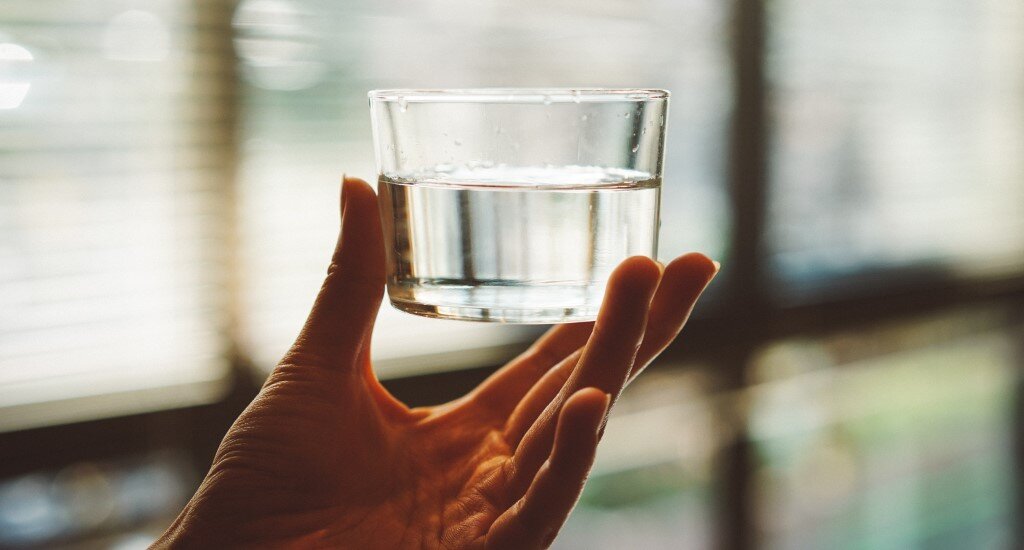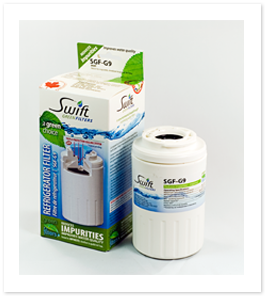Here is a listing of the best water systems for home use (click on the links to learn more about each type).
Find out about the best water systems for home use
Water Systems for Home Use
1. Pitcher Filters
There are many different kinds of water filters that you can purchase. You can choose from small to larger-sized pitchers that are equipped with a filter. You simply fill the pitcher up with tap water and place it in your fridge so that it is ready to use when you need it.
Pros and cons:
Pitcher filters are relatively inexpensive to buy ($50-$70) and simple to use. There is no installation required. The filters cost between $30-$40 to replace so depending on how much water your family uses, it could get quite expensive, however, compared to bottled water it is a better deal.
An average filter will produce the equivalent of about 300 bottles of water. If fridge space is limited in your home, then having to make room for a large pitcher of water could be an issue.
Another disadvantage of pitcher filters is that once you fill the pitcher you need to wait for it to filter; you can't enjoy your water right away. Pitcher filters only remove a limited number of contaminants in your water and they can't soften your water.
You have to wait for pitcher filters before you can drink the water
2. Fridge Filters
Refrigerators that are designed to dispense water are great and many models are equipped with filters that will take out many of the contaminants in your tap water.
Pros and Cons:
With fridge filtered water, you don't need to remember to fill up your water dispenser, the refrigerator is connected to your plumbing and it fills up as the water is used. You also don't have to wait for your water to get filtered before you drink it and you won't have a large jug taking up excess space in your fridge.
Like Pitcher filters, fridge filters only remove a limited amount of contaminants in your water and they can't soften your water.
With fridge dispensers you can enjoy filtered water anytime
3. Large Bottled Water
Purchasing large bottles of filtered water is one of the easiest and most economical water systems for home use. You can purchase your own large bottles and refill them as you need them.
Pros and Cons:
Using refillable large bottles of filtered water is a much more economical and environmentally friendly alternative to purchasing individual bottled water. It will cost you only about 20 cents per litre.
Some water companies will also provide prepaid water plans that can save you even more. The problem is that you do have to get your bottles refilled, however, if there is a convenient location near you, then it can just become one of your weekly or monthly errands.
In addition, you will probably need to invest in a water cooler to give you easy access to your water and to keep it cold. However, if you have small children, then a water cooler is a great way to encourage them to drink more water as it will be easier for them to access than trying to reach the kitchen tap or a jug in the fridge.
Some water companies offer prepaid water plans for extra savings
4. Dechlorinators
Many municipalities add chlorine to their water supply to help make it potable. If you don't like the taste of chlorine in your water, then installing a dechlorinator will remove any chlorine that is present in your tap water.
Pros and Cons:
A dechlorinator only removes chlorine from your water. If you have hard water and want to soften it, you will need to install a water softener as well. You can purchase water softeners that have a built-in dechlorinator, however, installing two separate units will save you in the long run.
Your initial costs will be slightly higher, but each individual unit will last longer and bring down your total cost of ownership considerably.
A dechlorinator will remove chlorine from you tap water
5. Water Purifiers (Reverse Osmosis)
One of the best water systems for home use is a reverse osmosis water purifier. Reverse osmosis systems purify water by forcing pressurized water through a very fine, plastic membrane which removes most of the contaminants in your tap water.
A reverse osmosis system can improve the taste of water for people who do not like the taste of dissolved mineral solids in their water. Reverse Osmosis Systems can remove common chemical contaminants such as:
Sodium
Chloride
Copper
Chromium
Lead
They may also reduce:
Arsenic
Fluoride
Radium
Sulfate
Calcium
Magnesium
Potassium
Nitrate
Phosphorous
Reverse Osmosis Systems are very effective in removing:
Protozoa (i.e. cryptosporidium, Giardia)
Bacteria (i.e. Campylobacter, Salmonella, Shigella, E. coli)
Viruses (i.e. Enteric, Hepatitis A, Norovirus, Rotavirus)
Pros and Cons:
A reverse osmosis water purifier is more expensive than using a jug or fridge filters or buying bottled water, however, there are many advantages to investing in one, including:
Remove Unwanted Substances: Reverse osmosis can remove dissolved solids, salts, minerals that cause hardness, organic chemicals and other impurities.
Improve Your Water's Taste: It can improve the taste of water for people who do not like the taste of dissolved mineral solids.
Protect Your Appliances: Treated water will not produce scale in kettles and coffee makers.
Helpful If You Need To Lower Your Sodium or Potassium: Because sodium and potassium are removed, people on a medically prescribed sodium or potassium restricted diet may benefit.
Learn more about how reverse osmosis works
6. Water Softeners
If you have hard water, then a water softener will make it soft. Hard water is a term used to describe water that has high concentrations of calcium and magnesium minerals. Hard water is safe to drink, but it may cause issues in your home such as cloudy water, water spots, clogged pipes, and calcium build-up that can damage hot water appliances.
A water softener can remove the calcium and magnesium from your water that makes it hard. Learn more about how a water softener works here.
Pros and Cons:
The biggest disadvantage to installing a water softener is the initial cost. However, some companies will offer financing options and low monthly payments. If you live in an area that has really hard water it is worth the investment. A water softener can help eliminate the following hard water problems.
Unsightly Film: You may notice an unsightly film that forms on your bathroom and kitchen tiles and fixtures.
Decrease in Water Pressure: You may also get a build-up of scale in your pipes that will eventually decrease your water pressure, especially in your hot water pipes.
Increase in Energy Bills: Over time, hard water will leave a scale build-up in your hot water heater that will cause it to be less efficient, use more energy, and cost you more in energy bills. This is because scale is a poor conductor of heat.
Spotty Dishes: Hard water also affects your glasses and dishes leaving them with a white film or spots after they have been cleaned.
Dry Skin: Hard water will leave behind a soapy film on your skin after showering. It can leave your skin feeling dry.
Limp and Dull Hair: You may find that your shampoo won't rinse out completely so your hair is left looking limp and dull.
Unpleasant Hot Drinks: Some people don't like the taste of tea or coffee made with hard water. In addition, if you have hard water, you may notice a foggy scum at the bottom of your drink that is quite unpleasant.
A water softener will help prevent limp and dull hair as well as dry skin caused from hard water
Why Choose WaterSmart for the Best Water Systems for Home?
WaterSmart has been serving the Waterloo region including, Kitchener, Cambridge, Guelph, Brantford, and surrounding areas since 1994 with innovative water systems for home use and excellent service.
We are committed to helping you improve the quality of your home's water. We live and work in the Kitchener-Waterloo region so we understand the hard water challenges of this area. We know how to program your water softener for maximum efficiency and are familiar with the types of water softener repairs that you might need.
Contact WaterSmart today to book an appointment.
““What a great experience!! I did a search on the internet, called regarding the price of a water softener and the next day it was installed and we had soft water again. Paul removed the old softener, installed and setup the new one and was out in just over an hour. He also noted that the grounding of water pipe was not done by previous installer and he corrected that as well. Cost was the same as softener that was installed 14 years ago - I am impressed.””













